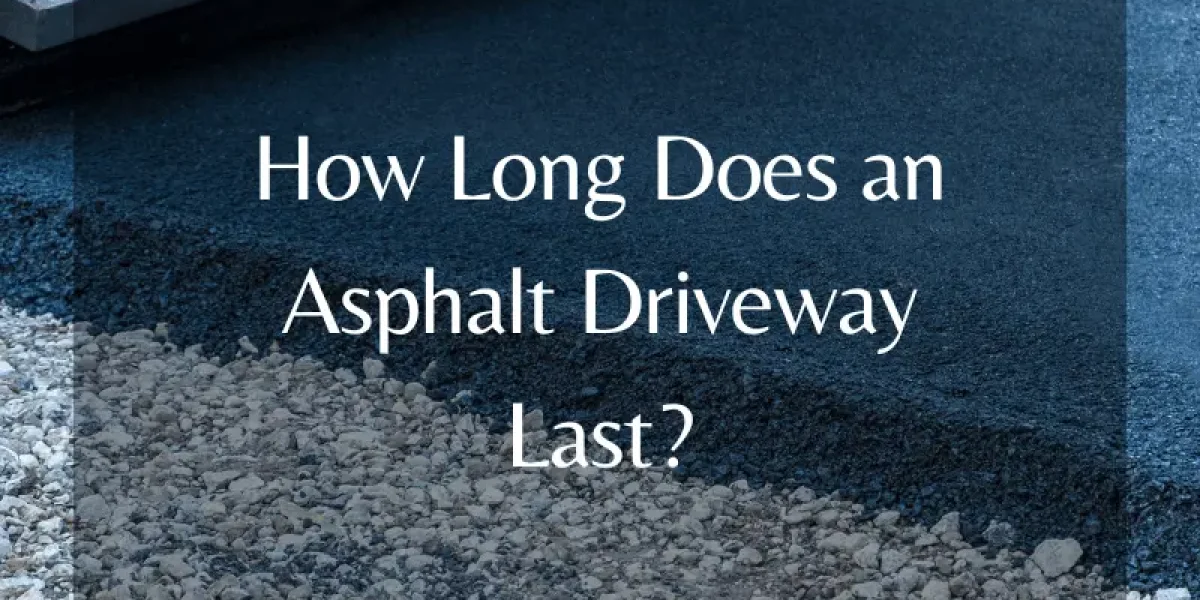If you’re thinking about getting an asphalt driveway, you might wonder: “How long will it last?” Most asphalt driveways last between 15 and 30 years, depending on how well they’re built, taken care of, and the kind of weather they face.
Here’s a simple breakdown:
- Normal lifespan: 15-30 years
- Little or no care: Around 15 years
- Regular sealing and crack fixing: 20-25 years
- Great installation and maintenance: Up to 30 years
What makes the difference? It mostly comes down to how it’s built, the weather, how it’s used, and how you care for it. A strong base with good-quality asphalt gives the driveway a better start. But if it’s rushed or done poorly, it may not last very long.
Weather plays a big role too. If you live in a place with very hot summers, freezing winters, or lots of rain, the driveway will wear out faster. Small cracks can grow if water gets in and freezes, leading to bigger problems like potholes.
Taking care of your driveway helps. Putting on sealant every few years, cleaning off oil or chemicals, and fixing cracks early can make it last much longer. Also, if you drive heavy trucks on it a lot, it will wear down quicker than if you just park regular cars.
What Factors Affect Asphalt Driveway Lifespan?
Asphalt driveways don’t last forever, but how long they hold up depends on a few important things. If you want your driveway to stay in good shape for a long time, it helps to know what helps and what hurts it. Here are the biggest things that affect how long an asphalt driveway can last:
- How It’s Installed: A driveway needs a strong foundation to last, which starts with proper base preparation. That means the ground underneath has to be flat and packed down with gravel or crushed stone before the asphalt is added. If this part isn’t done well, the driveway might crack or sink. The asphalt also has to be thick enough and rolled while it’s still hot. This helps it stay firm and hold together. If everything is done right, the driveway can last 20 to 30 years. If not, it might need repairs much sooner.
- Weather and Climate: Weather plays a big part in how long your driveway lasts. In hot places, the sun can dry out asphalt and make it crack. In cold places, water gets into tiny cracks, freezes, and expands. That makes cracks bigger and leads to potholes. Rain and snow are also a problem. If water gets into cracks or sits on the surface, it can weaken both the top layer and the base underneath.
- How Much It’s Used The more weight your driveway carries, the faster it can wear down. Cars don’t do much damage, but heavy trucks, RVs, or work vehicles can wear it out quickly. Even parking in the same spot every day can cause small cracks or dents. Turning your wheels while the car isn’t moving can also scrape the surface.
- Taking Care of It Your driveway doesn’t need a lot of attention, but it does need regular care. Putting on sealant every 2-3 years helps protect it from sun, rain, oil, and chemicals. Fixing little cracks before they grow and keeping the surface clean from oil stains, leaves, or trash also helps it last longer.
- Drainage and Ground Underneath Water is not good for asphalt. If your driveway doesn’t drain well, water can stay on top or soak in, which weakens the surface and what’s underneath. That’s why it should have a small slope to help water flow off. Also, the ground below needs to be solid. If it moves, sinks, or gets too soft, it can cause the asphalt to crack or become uneven. That’s why hiring an Driveway Paving Expert like Texpave Experts ensures proper site prep and long-lasting results. before laying the asphalt.
What Are the Signs Your Asphalt Driveway Is Wearing Out?
Your driveway goes through a lot of hot sun, heavy rain, and cars driving over it every day. Asphalt is strong, but it doesn’t last forever. Over time, it begins to show signs that it’s aging. If you know what to look for, you can address small problems before they escalate into bigger ones. Here are some signs that your asphalt driveway might need some attention:
- Cracks That Look Like Webs or Alligator Skin Tiny cracks might not seem like much at first, but they’re an early warning. If you see cracks that look like spiderwebs or alligator skin, water can get inside and make them worse. When it freezes, the water expands and pushes the cracks wider.
- Potholes Potholes are holes where pieces of asphalt have broken off. They happen when water sneaks under the surface and freezes, which makes the pavement break apart. Potholes can damage car tires and are easy to trip over.
- Fading and Dry Surface New asphalt is dark black and smooth. Over time, sun and rain turn it gray and dry. If you see sand or little stones coming loose from the surface, that means the top layer is breaking down, a sign that your driveway is getting old.
- Water Sitting on the Surface After rain, water should roll off your driveway. If you see puddles staying in low spots, it means the surface isn’t even anymore. These puddles can make damage worse, especially if water leaks into cracks.
- Bumps or Uneven Spots If your driveway feels bumpy, has dips, or looks like it’s wavy, the ground underneath may have moved or sunk. This can happen if the base wasn’t strong or if water has damaged it. Tree roots can also push the asphalt up and cause uneven spots.
- Constant Repairs Fixing small cracks now and then is normal. But if you keep having to patch holes or reseal the surface, your driveway might be too worn out. It may be time to think about resurfacing or getting a new one.
Seeing one or two of these signs doesn’t mean your driveway is ruined. But catching problems early helps you save money and avoid bigger repairs later. If you notice a few of these issues at once, it’s a good time to talk to a professional (like Texpave Experts) to see what can be done. Keeping your driveway in good shape helps keep your home looking nice and safe.
Can You Extend the Life of an Asphalt Driveway?
Yes, you can! With a little care, your asphalt driveway can last a lot longer. Think of it like taking care of a bike: clean it, check for damage, and fix things early so it works better for longer. Asphalt is strong, but things like sun, rain, oil spills, and heavy cars can wear it out. Luckily, some simple steps can help it stay in good shape.
- Seal It Every Few Years Sealcoating works like sunscreen and a raincoat for your driveway. It’s a black liquid that protects the surface from:
- Sun, which dries it out and fades the color
- Rain, which can get into small cracks and damage the base
- Oil or gas spills, which can weaken the surface
- Keep It Clean Leaves, dirt, and trash can trap water, while oil or gas spills can hurt the surface. Here’s what to do:
- Sweep it often
- Clean up oil stains with cleaner
- Pull out any weeds
- Rinse with water to wash away dirt
- Fix Cracks Quickly Small cracks can turn into big problems fast. Water can get inside, freeze, and make them worse. Fixing cracks early saves money and stops more damage.
- Use crack filler for small cracks
- Call a pro for bigger cracks
- Be Gentle With Weight Don’t park heavy trucks or campers in the same spot all the time. Spreading out the weight helps stop dents and damage.
- Try not to turn the wheels too hard while stopped
- Don’t leave big machines sitting on it too long
- Keep Water Away Water should roll off your driveway, not pool on it.
- Clear leaves from nearby drains and gutters
- Watch for puddles, they can wear out the surface quickly
- Handle Snow and Ice Carefully If you live where it snows, be gentle in winter:
- Use a plastic shovel instead of a metal one
- Don’t use harsh salt, sand works better and is safer
If you take care of small problems before they grow, you’ll save time and money. Regular care makes your driveway last longer, look better, and stay safe. A clean, smooth driveway helps your whole home look great.
Frequently Asked Questions
1. How long does asphalt driveway installation take from start to finish?
For a standard residential driveway, installation typically takes 2-4 days, including excavation, base preparation, asphalt laying, and compaction. Weather and site complexity can affect the timeline.
2. How do I prepare my property for asphalt driveway installation?
Start by clearing the site of vegetation and debris. Next, ensure proper grading and drainage planning. It’s also crucial to obtain permits if required by your local municipality before excavation begins.
3. Is 2 inches of asphalt enough for a driveway?
For light residential use, 2 inches of asphalt can work, but 3 inches is often recommended for improved strength and longevity, especially in areas with seasonal changes or higher vehicle traffic.
4. What is the best time of year to install asphalt?
The ideal season is late spring to early fall when temperatures are consistently above 50°F (10°C). Warm weather allows for proper compaction and curing, ensuring long-term durability of your asphalt driveway.


